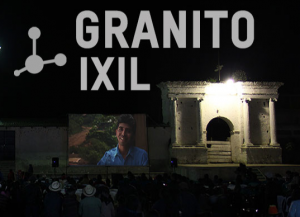Imagine empowering a new generation of human rights activists with a language that less than 40% of people speak in your country. “Granito: How to Nail a Dictator” tells the story of that generation in a feature-length documentary film about the thirty year struggle to bring Guatemala’s ex-dictator Rios Montt to justice for genocide against the Mayan population.
empowering a new generation of human rights activists with a language that less than 40% of people speak in your country. “Granito: How to Nail a Dictator” tells the story of that generation in a feature-length documentary film about the thirty year struggle to bring Guatemala’s ex-dictator Rios Montt to justice for genocide against the Mayan population.
What makes this film unique is that it is the first of it’s kind to give such an inside look at this genocide. It also breaks language barriers with a version of the film that is translated, recorded and released in the Mayan language of lxil. This translation eliminated the need for lxil subtitles and makes the film accessible to Mayan lxil speakers.
The lxil triangle, which includes the highland Guatemalan communities of Nebaj, Chajul and Cotzal, suffered the most causalities in a genocidal “scorched earth” military campaign led by former dictator Rios Montt. These mountainous Mayan communities lost hundreds of thousands of people in the 1980″s and ’90s and their culture of colorful dress, richly forested landscape and historically unique language of lxil were nearly wiped out. Today, many of the Mayan lxil speaking villagers are not literate nor do they speak Spanish or English.
The groundbreaking release of “Granito” in Ixil brings to the table the topics of accessibility, community and healing with its unprecedented language translation. Since the families most affected by the genocide speak lxil, their accessibility to the film was a priority to the filmmakers. It was also important for the filmmakers to show to the Mayan families the documented judicial process for convicting a dictator of horrendous crimes, which was unprecedented in itself. The narrative behind this process involved weaving together the story of five characters essential to the judicial process. As the filmmakers say, each one who would add their own granito to the story; a piece of sand to tip the scales of justice.
The Ixil translation of “Granito” may set a precedent for other films depicting such monumental events in history to be translated in the language of the people most affected. Many times in films we see modern western languages mainly distributed for films with subtitles of various other languages but for “Granito: How to Nail a Dictator” the importance of accessibility reigned supreme in terms of telling the story of the Mayan people.
The Ixil translation also symbolizes community and collective memory. The filmmakers, activists and lawyers in the film express through their actions that Mayan lxil speakers can find progress and healing in the future. They must not forget what happened to their people and collectively, they can continue to embrace their culture knowing that it did not die with the genocide that so horrifically oppressed their society.
The filmmakers also created an online memory project granitomem.com. It is a collective space for other people affected by the armed conflict in Guatemala. They can contribute their memories and “grains of sand” to the story so as to encourage more dialogue. The translator of the film, Matilde Terraza, said that by acknowledging the importance of the lxil culture and the significance of what happened to the Mayan people, the process of healing can begin. She felt that as a translator for the film and a native lxil speaker affected by the genocide, it was an opportunity to give back to the development of her people.
The precedent in dubbing and translation set by “Granito” represents a significant advancement in the conversation on whose stories we tell and how we choose to engage our core audiences with filmmaking.
To learn more about the film and it’s premier click HERE.
